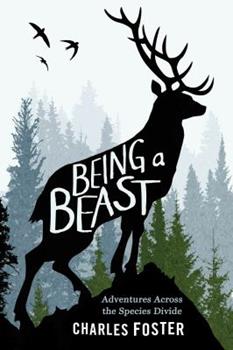
Being a Beast: Adventures Across the Species Divide – Charles Foster
2016, Metropolitan Books, 217 pp plus notes
Wow. I first heard of this book via Charles Foster’s short segment on This American Life in 2016. The segment was captivating, getting across so much of Foster’s intensity and eccentricity; and the audiobook for Being a Beast, also read by the author, is the same. I went back and forth between reading it on the page and listening, and I ended up actually doing both for many portions of the book (not at the same time) because the whole thing was so interesting and thought-provoking.
Foster has gone to great lengths to try to understand what it’s like to be a badger, an otter, an urban red fox, a red deer, or a swift. It sounds like he’s been an avid naturalist from early childhood and has kept a nature notebook throughout his life. He is also a qualified veterinarian, has a doctorate in medical law and ethics from Cambridge, and is a Fellow of Green Templeton College at Oxford. Now picture this man digging a badger sett on his friend’s farm in Wales, and living in it with his son, crawling around in the woods on all fours, and eating earthworms.
Earthworms taste of slime and the land. They are the ultimate local food and, as the wine people would say, have a very distinct terroir.
The earthworms were also mentioned in the radio segment; they grab your attention, don’t they? Come for the earthworms, stay for everything else. I learned a lot about all five of the animals in reading this book; it also started my mind in all kinds of directions as Foster raised such fascinating and important questions about the place of humans in the natural world and the extent to which we can understand the other creatures who share this incredible, threatened planet with us. I have to share this long quote, because it is so, so good:
The first [question] flows directly from heather, asphalt, and shamanism: Are there any limits to our ability to choose?
The fact that we have at least some autonomy is awesome and intimidating. We’re used to thinking that autonomy is most critically on trial in dramatic, occasional situations—such as when we’re considering the right to assisted suicide. But surely it’s the day-to-day choices that are the most terrifying and repercussive. Listen: you can choose whether to get up early, run around a field, have a cold bath, and then read Middlemarch. Or stay in bed and watch shopping TV. That’s astonishing. I can never get over it. That’s a choice between life and death. Therefore choose life.
214-215
The chapter on swifts was my very favorite. No one could fail to marvel at a bird that, from the time it fledges from its nest until it returns to a chimney four years later to build a nest for its own offspring, never touches down for a moment. “Until it flew into our roof above my head it hadn’t touched the ground, or a tree, or a building, or anything but insects and the air in four years.” (189) Just think: there could be swifts sleeping on the wing above you right now, two miles into the atmosphere, too high up for you to see even with high-powered binoculars.
It made me want to build a freestanding chimney in our back yard (a curse upon Homeowners Association rules!). We did live next door to a 1914 farmhouse for five years and got to watch that house’s chimney swifts in their amazing flights. This summer, a pair of barn swallows built a nest above the security camera at our neighborhood pool, and watching their four babies hatch, grow, and fledge has been an amazing highlight of our summer. But I haven’t seen a swift for years. I hope to read Foster’s recent book that focuses more on swifts, The Screaming Sky, very soon, and several of his other books also look appealing. I think it must be wonderful to hear about his experiences as a Cro-Magnon hunter-gatherer and a Neolithic farmer in his 2022 book Being a Human: Adventures in 40,000 Years of Consciousness. Since I enjoyed him as a reader so much, though, I’m disappointed that he doesn’t read the audiobook for that one.
Because Being a Beast made me laugh, made me cry, and made me see nature in an entirely new light, I would highly recommend it even to people who don’t normally read nature books.
